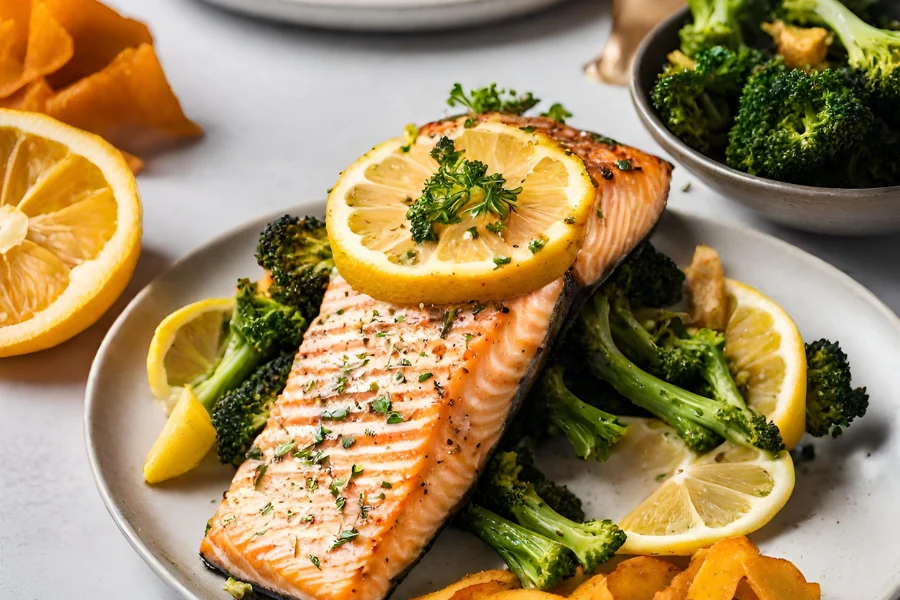Eating for heart health can sometimes feel like navigating a maze of contradictory information online. With so many recommendations—eat this, avoid that—it’s easy to feel overwhelmed. However, the key lies in balancing macronutrients and ensuring you’re getting appropriate nutrition. This meal provides an excellent source of all macronutrients while keeping things simple, using the convenient method of an air fryer. Additionally, incorporating salmon into your diet offers numerous benefits for heart health. Salmon is rich in omega-3 fatty acids, reducing inflammation, lowering blood pressure, and decreasing the risk of heart disease.
Salmon Ingredients (Serves 1):
- 200 grams salmon fillet
- 1/2 clove garlic, minced
- 1 teaspoon chopped fresh parsley
- 1 teaspoon chopped fresh dill
- Zest of 1/2 lemon
- Salt and pepper to taste
- Thin slices of lemon for baking on top
- Optional: Chili flakes for a spicy kick
Pumpkin Chips Ingredients:
- 250 grams pumpkin (butternut squash)
- 1/2 tablespoon olive oil
- 1/4 teaspoon sea salt
- pinch black pepper
- Chili flakes/ cayenne pepper optional to taste
Broccoli florets Ingredients:
-
- 200 grams of broccoli florets
- 1/2 tablespoon olive oil
- Juice of 1/2 lemon
- Salt and pepper to taste
Instructions:
Preheat Air Fryer: Preheat your air fryer to 375°F (190°C).
Prepare Salmon: Place the salmon fillet in the air fryer basket. Season it with minced garlic, chopped fresh parsley, chopped fresh dill, lemon zest, salt, and pepper. Top with thin slices of lemon.
Prepare Pumpkin Chips: Peel the pumpkin and remove the seeds. Slice the pumpkin thinly into chip-sized pieces. Toss the pumpkin slices with olive oil, sea salt, and black pepper until evenly coated. Place the seasoned pumpkin slices in the air fryer basket in a single layer.
Prepare Broccoli: Trim the ends of the broccoli and place in a bowl. Drizzle with olive oil, lemon juice, salt, and pepper, tossing until evenly coated.
Air Fry: Place the baskets with salmon and pumpkin chips in the air fryer. Cook for 10-12 minutes until the salmon is cooked through and flakes easily with a fork, and the pumpkin chips are golden brown and crispy.
Add Broccoli: After 5 minutes of cooking the salmon and pumpkin, add the broccoli to the air fryer basket. Continue cooking for 5-7 minutes until the broccoli is tender-crisp.
Serve: Plate the air-fried salmon, pumpkin chips, and broccoli together. Enjoy your perfectly balanced, heart-healthy meal!
This balanced dish provides essential macronutrients, including protein from the salmon, fiber, and vitamins from the pumpkin and broccoli, and extra healthy fats from the olive oil. Enjoy the heart-healthy benefits of omega-3 fatty acids in the salmon, which may help reduce inflammation and lower the risk of heart disease. With its simplicity and ease of preparation, this meal is perfect for a quick evening meal that will keep you feeling satisfied for longer.


